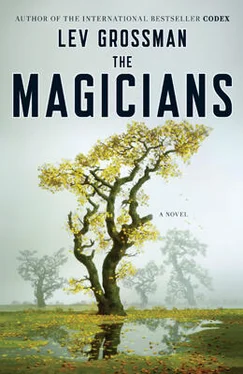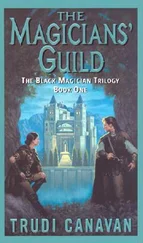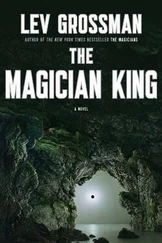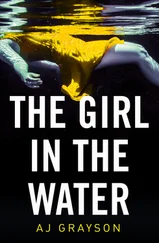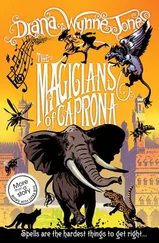For a moment her face lost its composure, just for a moment. Her eyes welled with tears, and she blinked rapidly.
“I keep telling myself that we lost him that first night, when he walked away into the forest. It was never him after that, not really. He died a long time ago. But I’m the only Chatwin left now. He was a monster, but he was the last family I had.”
“And we killed him,” Quentin said coldly. His heart was palpitating. The feeling he’d had trouble identifying earlier was clarifying itself: it was rage. This woman had used him, used them all like toys. And if some of the toys got broken, oh well. That had been the real point of the whole story all along. She had manipulated him, sent him and the others into Fillory to find Martin. She had made sure he got there. For all he knew she’d planted the button for Lovelady to find in the first place. It didn’t matter now. It was over, and Alice was dead.
He stood up. A cool, grassy evening breeze stirred the green curtains.
“Yes,” Jane Chatwin said carefully. “You killed him. We won.”
“We won?” He was incredulous. He couldn’t hold back anymore. All the grief and guilt he’d been salting away so carefully was coming back to him as anger. The ice was cracking. The pond was boiling. “We won? You have a damn time machine in your pocket, and that’s the best you could do? You set us up, Jane, or whoever the fuck you are. We thought we were going on an adventure, and you sent us on a suicide mission, and now my friends are dead. Alice is dead.” Here he had to swallow hard before he could go on. “Is that really the best you could do?”
She dropped her eyes to the floor. “I am sorry.”
“You’re sorry.” The woman was unbelievable. “Good. Show me how sorry you are. Take me back. Use the watch, we’ll go back in time. We’ll do it all again. Let’s go back and fix this.”
“No, Quentin,” she said gravely. “We can’t go back.”
“What do you mean, no? We can go back. We can and we will!”
He was talking at her louder and louder, staring at her, as if by talking and staring he could force her into doing what he needed her to do. She had to! And if talking wouldn’t do it, he could make her. She was a small woman, and apart from that watch he was willing to bet that he was twice the magician she’d ever be.
She was shaking her head sadly.
“You have to understand.” She didn’t back away. She spoke softly, as if she could soothe him, placate him into forgetting what she’d done. “I’m a witch, I’m not a god. I’ve tried this so many ways. I’ve gone down so many different timelines. I’ve sent so many other people to fight Martin. Don’t make me lecture you on the practicalities of chronological manipulation, Quentin. Change one variable and you change them all. Did you think you were the first one to face Martin in that room? Do you think that was even the first time you faced him? That battle has been fought again and again. I’ve tried it so many different ways. Everyone always died. And I always wound back the clock.
“As bad as it was, as bad as it is, this is by far the best outcome I’ve ever achieved. No one ever stopped him but you and your friends, Quentin. You were the only ones. And I’m sticking with it. I can’t risk losing everything we’ve gained.”
Quentin folded his arms. Muscles were jumping in his back. He was practically vibrating with fury. “Well, then. We’ll go back all the way. To before The World in the Walls . Stop him before it all starts. Find a timeline where he doesn’t even go to Fillory.”
“I’ve tried, Quentin! I’ve tried!” She was pleading with him. “He always does! I’ve tried it a thousand times. There is no world where he doesn’t.
“I’m tired. I know you lost Alice. I lost my brother. I’m tired of fighting that thing that used to be Martin.”
Suddenly she did look very tired, and her eyes lost their focus, as if she were seeing into some other world, one she would never get to. It made it hard for him keep up his high-pressure rage. It kept bleeding away even as he stoked it.
This wasn’t over. He lunged, but she saw it coming. He was quick, but she was quicker. Maybe they’d played this scene already, in another timeline, or maybe he was just that obvious. Before he was halfway across the room she spun on her heel and threw the silver watch as hard as she could at the wall.
It was hard enough. The wall was stone, and the watch squashed like an overripe fruit. It made a sound like a bag of nickels. The delicate crystal face shattered, and tiny gears and wheels skittered away across the floor like pearls from a broken necklace.
Jane turned back to him defiantly, breathing hard. He stared down at the corpse of the broken timepiece.
“No more,” she said. “Put an end to it. It’s time to live with what we have and mourn what we lost. I wish I could have told you more before it was too late, but I needed you too much to tell you the truth.”
In a curious gesture she placed her hands on his cheeks, drew his face down to hers, and kissed him on the forehead. The room was almost dark now. The door creaked in the quiet spring evening as she opened it.
“Try not to judge Martin too harshly,” she said from the doorway. “Plover used to diddle him whenever he could get him alone. I think that’s why he went to Fillory in the first place. Why else would he try to crawl into a grandfather clock? He was looking for somewhere to hide.”
With that she was gone.
Quentin didn’t go after her, just stared at the doorway for a long minute. When he walked over to the door to close it, pieces of the broken watch scrunched under his feet.
It just went down and down. Had he finally gotten to the bottom of it? In the last of the dying light he looked down at the notebook on the hard centaur bed. There was a note tucked into the pages, the same one the wind had snatched away from him the first time he tried to read it. But all it said was:
SURPRISE!
He sat back down. In the end he and Alice had just been bit players, extras who had the bad luck to wander into a battle scene. A brother and sister at war with each other in their nightmare nursery fantasyland. No one cared that Alice was dead, and no one cared that he wasn’t.
Now he had answers, but they weren’t doing what answers were supposed to do: they weren’t making things simpler or easier. They weren’t helping. Sitting there on his bed, he thought about Alice. And poor, stupid Penny, and miserable Eliot. And that poor bastard Martin Chatwin. He got it now, of course, finally. He’d been going about this all wrong. He should never have come here at all. He should never have fallen in love with Alice. He should never even have come to Brakebills. He should have stayed in Brooklyn, in the real world. He should have nursed his depression and his grudge against the world from the relative safety of mundane reality. He never would have met Alice, but at least she would be alive, somewhere. He could have eked out his sad wasted life with movies and books and masturbation and alcohol like everybody else. He would never have known the horror of really getting what he thought he wanted. He could have spared himself and everybody else the cost of it. If there was a moral to the story of Martin Chatwin, that was it in a nutshell. Sure, you can live out your dreams, but it’ll only turn you into a monster. Better to stay home and do card tricks in your bedroom instead.
It was partly Jane’s fault, of course. She had lured him on at every turn. Well, he wouldn’t get fooled again. He wouldn’t give anybody the chance. Quentin felt a new attitude of detachment descend on him. His molten anger and grief were cooling into a glossy protective coating, a hard transparent lacquer of uncaring. If he couldn’t go back, he would just have to do things differently going forward. He felt how infinitely safer and more sound this attitude was. The trick was just not wanting anything. That was power. That was courage: the courage not to love anyone or hope for anything.
Читать дальше
